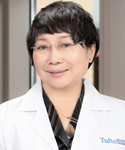 Editor’s note: ACR on Air, the official podcast of the ACR, dives into topics important to the rheumatology community, such as the latest research, solutions for practice management issues, legislative policies, patient care and more. Twice a month, host Jonathan Hausmann, MD, a pediatric and adult rheumatologist in Boston, interviews healthcare professionals and clinicians on the rheumatology front lines. In a series for The Rheumatologist, we provide highlights from these relevant conversations. Listen to the podcast online at acronair.org, or download and subscribe to ACR on Air wherever you get your podcasts. Here we highlight episode 21, “Use of Complementary Alternative Therapies in Rheumatic Care,” which aired on April 20, 2021.
Editor’s note: ACR on Air, the official podcast of the ACR, dives into topics important to the rheumatology community, such as the latest research, solutions for practice management issues, legislative policies, patient care and more. Twice a month, host Jonathan Hausmann, MD, a pediatric and adult rheumatologist in Boston, interviews healthcare professionals and clinicians on the rheumatology front lines. In a series for The Rheumatologist, we provide highlights from these relevant conversations. Listen to the podcast online at acronair.org, or download and subscribe to ACR on Air wherever you get your podcasts. Here we highlight episode 21, “Use of Complementary Alternative Therapies in Rheumatic Care,” which aired on April 20, 2021.
When used along with traditional therapy for rheumatic diseases, complementary and integrative therapies, such as acupuncture and tai chi mind-body practice, can benefit patients, according to Chenchen Wang, MD, MSc, a professor at Tufts University School of Medicine, Boston, and director of the Center for Complementary and Integrative Medicine in the Division of Rheumatology at Tufts Medical Center, Boston.
Dr. Wang, who has led several studies related to tai chi and other integrative approaches for musculoskeletal pain conditions, discussed her findings and perspectives with Dr. Hausmann, ACR on Air podcast host and a pediatric and adult rheumatologist in Boston.
The Terminology
 Drs. Hausmann and Wang drilled down to identify the preferred terminology for therapies, such as acupuncture and tai chi. Until recently, these were often called alternative therapies. Nowadays, complementary or integrative are the preferred terms used to describe them.
Drs. Hausmann and Wang drilled down to identify the preferred terminology for therapies, such as acupuncture and tai chi. Until recently, these were often called alternative therapies. Nowadays, complementary or integrative are the preferred terms used to describe them.
“Integrated health brings a conventional and complementary approach together in a coordinated way,” Dr. Wang says. She noted that the National Center for Complementary and Integrative Health defines integrative health as well-coordinated care among different providers that uses conventional and complementary approaches to care for the whole person rather than just one organ system.1
Dr. Hausmann applauded the concept of integrative health, while acknowledging current limitations. “We may be prescribing all the right medicines, but we’re leaving the patient behind. I like the concept that this is not something to do instead of [prescribing tumor necrosis factor] inhibitors or methotrexate. This is something that you should integrate in the care of rheumatic disease,” he says.
Acupuncture
Acupuncture is one treatment becoming more mainstream. Acupuncture, which began with traditional Chinese medicine thousands of years ago, involves inserting and manipulating fine needles to stimulate specific anatomic points in the body, Dr. Wang explained. This method can help facilitate better health.